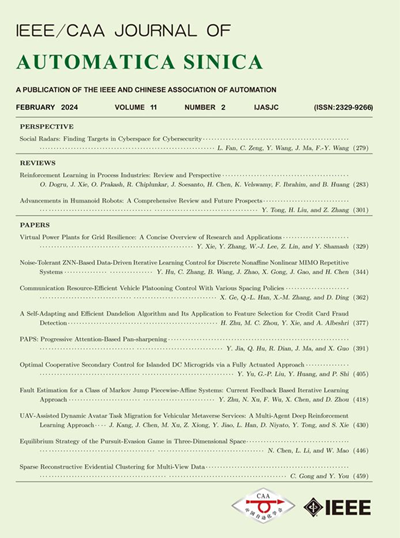基于强化学习的无人机辅助MIMO通信系统频谱性能优化
IF 19.2
1区 计算机科学
Q1 AUTOMATION & CONTROL SYSTEMS
引用次数: 0
摘要
这封信是关于无人机(UAV)辅助多输入多输出(MIMO)通信系统的稳定高质量信号传输问题。采用粒子群优化算法对系统进行波束形成和功率分配优化。此外,在传统粒子群算法中引入敏感粒子(SP)和参数自适应调整,以提高粒子群算法在无人机位置实时变化的动态环境中的性能。提出了一种基于强化学习(RL)的无人机最优轨迹获取方法和PSO参数自适应调整策略,并结合特定的避障方案,在满足高质量信号传输的同时实现无人机精确导航。仿真实验表明,与目前常用的单RL方案相比,该方案提供了更高、更稳定的频谱效率和更高效的无人机导航。本文章由计算机程序翻译,如有差异,请以英文原文为准。
Reinforcement Learning-Based Spectral Performance Optimization for UAV-Assisted MIMO Communication System
Dear Editor, This letter is concerned with the problem of stable high-quality signal transmission of unmanned aerial vehicle (UAV)-assisted multiple-input multiple-output (MIMO) communication system. The particle swarm optimization (PSO) algorithm is used to achieve optimal beamforming and power allocation for this system. Additionally, sensitive particle (SP) and parameter adaptive adjustment are introduced into the traditional PSO algorithm, aiming to improve the performance of the PSO algorithm in dynamic environments with real-time changes in the UAV position. A reinforcement learning (RL)-based approach is proposed to obtain optimal UAV trajectory and adaptive adjustment strategy for PSO parameters, which combine with a specific obstacle avoidance scheme to achieve accurate UAV navigation while satisfying high-quality signal transmission. Simulation experiments show that our scheme provides higher and more stable spectral efficiency as well as more efficient UAV navigation than the currently commonly used scheme with a single RL approach.
求助全文
通过发布文献求助,成功后即可免费获取论文全文。
去求助
来源期刊

Ieee-Caa Journal of Automatica Sinica
Engineering-Control and Systems Engineering
CiteScore
23.50
自引率
11.00%
发文量
880
期刊介绍:
The IEEE/CAA Journal of Automatica Sinica is a reputable journal that publishes high-quality papers in English on original theoretical/experimental research and development in the field of automation. The journal covers a wide range of topics including automatic control, artificial intelligence and intelligent control, systems theory and engineering, pattern recognition and intelligent systems, automation engineering and applications, information processing and information systems, network-based automation, robotics, sensing and measurement, and navigation, guidance, and control.
Additionally, the journal is abstracted/indexed in several prominent databases including SCIE (Science Citation Index Expanded), EI (Engineering Index), Inspec, Scopus, SCImago, DBLP, CNKI (China National Knowledge Infrastructure), CSCD (Chinese Science Citation Database), and IEEE Xplore.
 求助内容:
求助内容: 应助结果提醒方式:
应助结果提醒方式:


